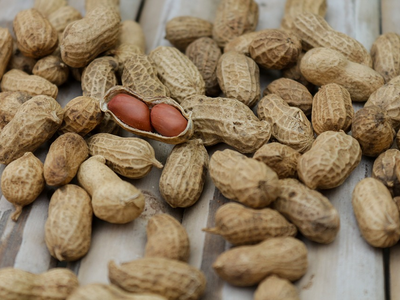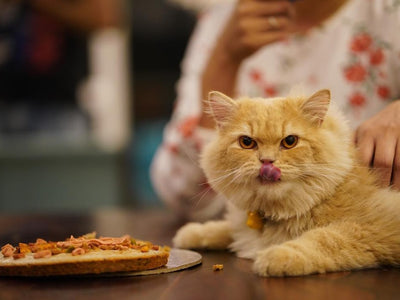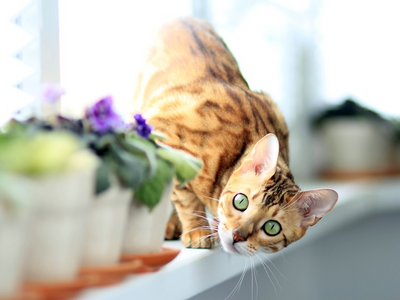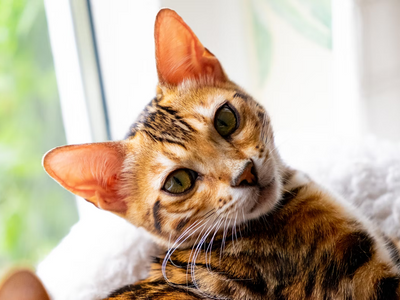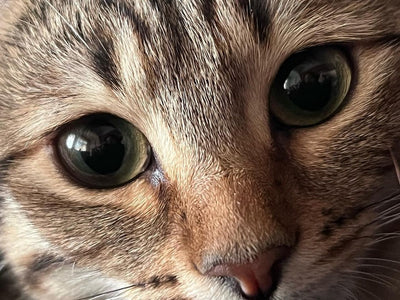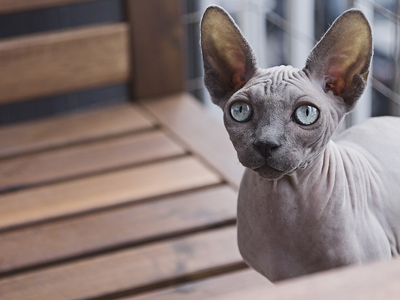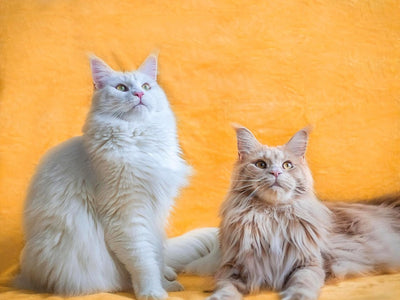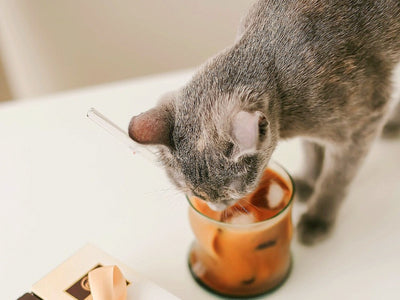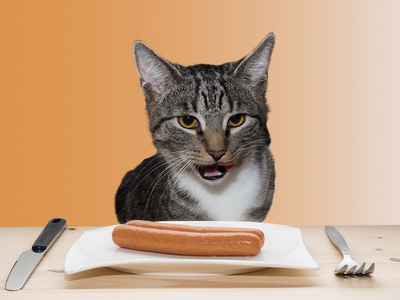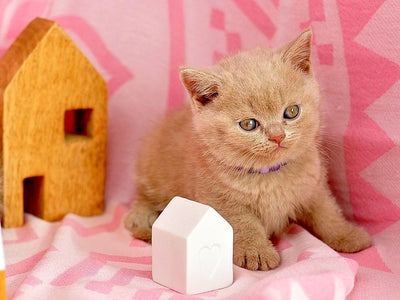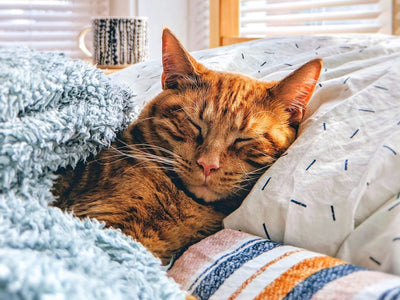13.04.2022
How to handle common Maine Coon food allergies—Untamed offers top solutions
Maine Coons are big cats and hearty eaters. When healthy, these kitties can gobble up an entire meal within minutes! Unfortunately, Maine Coon food allergies can be a lingering source of stress for this breed.
Bring them any new food, and they might have a reaction and throw up. Get them prescription food from a vet, and they vomit again. Many cat parents find themselves in this vicious cycle of changing products and diets for their Maine Coon, failing to find a feasible solution. What’s even worse is that frequent dietary changes often lead to stomach sensitivity and anxiety in felines.
The good news is that you can manage food allergies and intolerances in Maine Coons with the right wet food. Finding suitable products tailored to soothe stomach sensitivities in this breed is not easy. We’ll help you:
- Understand what's triggering allergic reactions in your kitty
- Determine viable solutions
Are Maine Coons prone to food allergies?
Certain breeds, like Siamese, are genetically predisposed to food allergies, but not Maine Coons. In the early 19th century, these kitties used to be barn cats living rough outdoor lives, often hunting down and feasting on random bugs and slugs! Being large, they have always had a healthy appetite and a high basal metabolic rate.
Of late, many cat parents have reported their Maine Coons experiencing frequent bouts of vomiting, regurgitation, and diarrhoea after consuming commercial food, usually products made with fillers and harsh additives.
While a food allergy or intolerance can trigger repeated gastrointestinal episodes, they are not always the culprits. Based on the general eating habits of Maine Coons, they tend to throw up often because of eating too much or too fast. Barfing can also be associated with underlying illnesses like hyperthyroidism, diabetes, pancreatitis, constipation, and dental and intestinal infections.
A reliable way to detect food allergies in cats is to look for signs beyond gastrointestinal issues. If your kitty is allergic to any ingredient in food, they usually display the following additional symptoms:
- Runny nose and sneezing fits
- Itchy, red, and watery eyes
- Wheezing and coughing
- Inappetence
- Nausea, dizziness, and lethargy
- Swollen paws
- Irritated skin
- Chronic shedding (Maine Coons may have excessive hairballs)

Hair here, hair there, hair everywhere—Maine Coons with food allergies may start losing their signature fur unnaturally.
Source: snoopyandtipsy
What ingredients in cat food commonly trigger Maine Coon food allergies?
Your kitty’s regular wet or dry food can contain components your kitty is allergic to. Based on the experiences shared by many Maine Coon parents, this breed can be allergic to any of the following ingredients:
- A particular type of meat or protein—Maine Coons can react to a specific kind of meat in a product. Beef is the most common allergen for this breed. They may also be allergic to other proteins used in cat food, such as:
- Gluten (extracted from grains)
- Soya concentrates
- Casein (milk protein)
- Pea, potato, or rice protein
- Ovomucoid and ovalbumin (egg proteins)
- Carbs—Cats depend on a meat-based diet. Their system produces digestive enzymes tuned to break down animal proteins, not carbohydrates. While kitties have adapted to digest some carbs, their immune system can reject foods loaded with this nutrient. If your kitty’s food includes grains, sugar, and starches, they might trigger an allergic reaction
- Dairy—Dairy allergy or intolerance is common in adult cats. Maine Coon kittens can handle milk when freshly weaned off, but they gradually lose the ability to process the proteins and sugar in it. Unfortunately, cats adore the taste of milk, so many manufacturers use it to increase the palatability of food
- Artificial additives—Additives in cat food include chemical preservatives, taste enhancers, and food colourants. Dry and semi-moist food also have several gelling and thickening agents. These additives are not natural to felines and can easily trigger allergies
A 2016 study on 78 cats outlined the following as major allergens:
|
Allergen |
Percentage of cats afflicted |
|
Beef |
18% |
|
Wheat, corn, and dairy |
4% |
|
Lamb, egg, barley, and rabbit |
Around 3% |

Are you sure the proteins made me throw up? At this point, my tummy’s so stressed even water makes me gag.
Source: torao_511
What’s the best way to treat allergies in Coon cats?
You’ll find numerous methods to handle feline food allergies on the internet, but how reliable or feasible are they? Let’s take a look at popular allergy management diets for pets.
Raw diet
Since cats often suffer from food allergies caused by processed products, switching to raw food seems like going back to their roots. While raw meat is easily digestible to felines, scientists don’t recommend giving it to indoor pets due to the risk of:
- Pathogen contamination during storage and handling (applies to both store-bought and home-prepared raw food)
- Food poisoning and bacterial infections
- Cross-contamination between pets and humans
Wild cats eat raw food in the form of fresh prey. Commercial raw food (frozen or freeze-dried) is often stored for months, and many studies point out the potential contamination with harmful bacteria like Salmonella and Campylobacter. Currently, you’ll find products like raw chicken, liver, and frozen mice being sold as Main Coon raw food, but it’s prudent to consult a vet before letting your kitty try them.
Hypoallergenic cat food for Main Coons
Hypoallergenic cat food is usually made with limited ingredients in a simple formulation. Such products are meat-based and don't contain common allergens like wheat, beef, dairy, soya, eggs, sugar, and chemical additives. They should help your cat’s stressed digestive tract to stabilise, gradually reducing the frequency of gastrointestinal episodes. Some protein allergies in cats go away after a temporary dietary restriction of the allergen and regular hypoallergenic meals.
Unfortunately, hypoallergenic has become synonymous with pricey, so many parents don't want to commit to such products. The truth is, “hypoallergenic” is an unregulated term, and the quality of products varies from brand to brand. An ideal allergen-free product would be sanitarily cooked human-grade whole meat and should cost about the same as regular wet food. Products with undefined meat derivatives and “healthy” vegetable extracts cannot be described as hypoallergenic.

Allergy management cat food should be uncorrupted—no grains, no fillers, only real meat.
Image (c) Untamed
A novelty protein diet
Novelty protein sounds fancy, but it refers to any protein your kitty hasn’t tried before and is, therefore, probably not allergic to it. If your cat has eaten turkey or beef products in the past, something as common as chicken would be a novelty for them.
Many cat parents go for unconventional proteins like kangaroo and ostrich meat (which are super expensive) because their pet has tried all standard meats (or meat flavours) used in cat food. It’s an extravagant solution when you can use a cost-effective whole meat product to tame allergies.
Cat food with hydrolysed proteins
Hydrolysed proteins are pre-digested proteins, i.e. proteins chemically broken down into amino acid and peptide components. Theoretically, the feline digestive tract won’t identify the fragmented proteins as allergens.
Hydrolysed protein powder is generally used as a flavour enhancer in processed products, and its effectiveness in allergy management is under-researched and highly debated. These proteins can also be counterproductive, with many studies registering allergy flare-ups and dermatitis in pets on a hydrolysed diet.
If your Main Coon is sensitive, try Untamed!
Keeping the diet simple is the secret to taming food allergies and sensitivities in all cats. At Untamed, we stick to whole meat simmered in light broths and gravies. Our gravy and jelly products have 60%–63% human-grade meat, gently steamed to be super soft and easy on the tummy. We avoid meat derivatives, plant extracts, grains, sugar, dairy, and chemical additives, so our products are free from all known allergens. If your kitty has severe food allergies, start with our single-protein meals:
- Chocka Chicken in Jelly
- Tuck-in Tuna in Jelly

Cat food that protects your kitty’s tummy—Untamed brings calm to the chaos.
Image (c) Untamed
We also offer highly digestible meals with a kick of salmon, duck, mackerel, sardine, and ham, appropriate for cats of all breeds and ages. Our dishes are:
- High-protein—Quality proteins ensure a healthy immune system and metabolism function for your lil’ carnivore, and we offer two times more than the average products on the market
- Vet-formulated—Vets have helped us create balanced formulas containing essential nutrients in suitable ratios. Our meals have taurine and vitamin E that help fight allergic inflammation
- Delicious—Our meals keep the natural aroma and flavour of the meat and fish that win over the pickiest eaters!
- Made according to the highest ethical standards—We get our ingredients from sustainable suppliers and use recyclable packaging for all products
If you want to customise a meal plan according to your kitty’s needs, take our TRY NOW quiz—you can order an assorted taster pack at a competitive price!
We take feline health seriously
Since our formulas work for all cats, you can safely introduce your diarrhoea-prone kitten or senior to our meals. Untamed is ideal for:
- Helping kittens grow and gain weight steadily (with a planned meal schedule)
- Strengthening weak and recuperating cats
- Balancing the weight in anorexic or overweight cats (with suitable portions)
- Meeting increased caloric needs of pregnant cats
- Managing age-related conditions like diabetes, cystitis, and UTIs in seniors
Going Untamed is a solid investment that pays off. Here’s what our happy clients have shared after switching their kitty to our dishes:
|
Timeline |
Benefits |
|
One week |
|
|
Two months |
|
|
Four months |
|
|
Beyond six months |

Let your furballs feast like glorious kings and queens on nutritious Untamed meals!
Image (c) Untamed
Get our trial pack first!
In case you’re not sure if your furry diva will accept new food, here’s a sweet deal. Get our taster pack and let them try. We don’t charge extra for shipping, and you are free to modify or cancel an order anytime!
Follow these steps online to get a cat food taster pack delivered to your doorstep in a day:
- Take our TRY NOW quiz
- Select the products
- Place the order
Should your cat fall in love with our delicacies, we'll deliver a fresh batch of Untamed goodies every month—sign up for our subscription service today!
Why Maine Coons on dry food are more likely to have food allergies
Many Maine Coons with food allergies have been on kitty biscuits for a long time, and changing products doesn’t alleviate their condition. That’s because dry food is a cocktail of many ingredients, and it gets incredibly hard to identify the allergen.
Besides carbs and additives, biscuits also have various processed proteins like meat, fish, and bone meals. The best remedy is to introduce a regular diet of grain-free wet food with a single source of protein and limited ingredients.
Try a mixed diet temporarily if they aren’t used to wet food, but the ultimate goal should be to eliminate dry food from their daily meals.
If you’re trying to tame food allergies in your feline, be mindful of your kitty’s snacks and treats and ensure they don’t have access to toxic food that can negatively affect their gastrointestinal stability.

![Associated image for What human food can Sphynx cats eat? [Comprehensive list]](http://untamed.com/cdn/shop/articles/what_human_food_can_sphynx_cats_eat_Featured_400x300_crop_center.jpg?v=1648705074)
